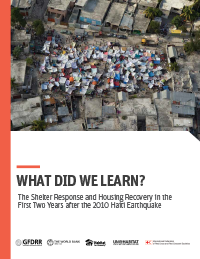Worldwide, the convergence of population growth, unplanned urbanization, and natural hazards are causing a concentration of risks in cities. When the earthquake struck Haiti in January 2010, the country embodied many of the factors that contribute to vulnerability: rapid urbanization, a largely informal economy with extreme disparities, and fragile governance mechanisms and institutions. In addition, Haiti was highly dependent on external partners for both social and economic support.
This report on lessons learnt from Haiti housing recovery is meant to help countries and recovery agencies understand how vulnerability not only contributes to disasters but complicates recovery. It provides advice to governments on more effectively directing its partners and better managing housing recovery. .
The World Bank and the Global Facility for Disaster Reduction and Recovery (GFDRR) and their partners, the International Federation of the Red Cross and Red Crescent Societies (IFRC), UN-Habitat, and Habitat for Humanity International, joined forces beginning in 2013 to analyze what was learned from the 2010 Haiti earthquake shelter response and housing recovery experience. This report -- based on research and reflections among people and organizations involved in the international community’s urban shelter and housing assistance efforts following the 2010 Haiti earthquake-- is the outcome of that process.

